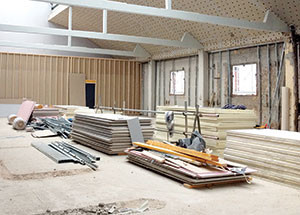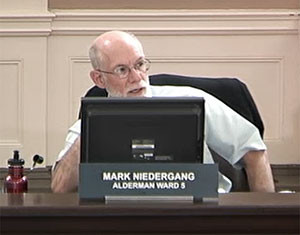
Procedures for condominium conversion approval have been tightened up by the city’s Condominium Review Board at the behest of concerned Board of Aldermen members.
By Josie Grove
The January 25 meeting of the Condominium Review Board saw some limited reforms after Ward 5 Alderman Mark Niedergang brought up problems of the board’s function at a recent Board of Aldermen meeting. The review board is charged with reviewing applications for the conversion of rental properties to condominiums, and with upholding Somerville’s condominium conversion ordinance.
The ordinance was enacted in 1980 to govern the process of converting rental properties to condominiums. Among other provisions, the ordinance says that a tenant must receive one year’s notice before the property owner files the master deed and applies for a condo conversion permit, and another year before they must leave, two years if the tenant is elderly, disabled, or low income. Alderman Niedergang was concerned after he attended a disorganized meeting where he thought condo conversions were being “rubber-stamped” without regard for the ordinance.
To understand what changes needed to be made, Assistant City Solicitor David Shapiro met with Office of Strategic Planning and Community Development Housing staff including the Director of Housing Mike Feloney and Sustainable Neighborhoods program coordinator Alex Bob.
“We have come to some slightly different practices for this meeting,” Bob said at the meeting. “Instead of the past procedure, where we would be giving out removal permits for conversion of rental properties to condominiums, we will be giving out what we have here, a certification of condo review board approval, which is not a permit. It is basically a certificate that says approval has been given by the board, but permit is conditional upon provision of a master deed and a report on the physical conditions of the property.”

Ward 5 Alderman Mark Niedergang expressed his approval of new processes put into place that he felt helped to protect the rights of tenants of buildings that are up for condominium conversion by interested developers.
A master deed is a document detailing how the property will be divided, and the report on the physical condition of the property will have to be prepared by an architect or engineer. Both documents are referenced in the ordinance, but had been issued after the conversion permit was granted.
“They clearly reviewed the process and made some thoughtful decisions about it,” said Alderman Niedergang after the meeting. “They were able to respond to questions and objections that were raised. The staff was much better prepared. It’s always good for a board like this to review procedure.”
After the meeting, developers Victor Cabral and Roland Muise were critical of the new process, which they said would make it slower and more difficult to convert a property to a condominium. “It’s just because of a few bad apples,” said Muise, referencing developers who skirt the rules. Part of Niedergang’s initial concern stemmed from the rule-bending Muise referenced: by creating incentives for landlords to evict their tenants and sell the buildings empty, developers can avoid the waiting periods.
In a written statement, the OSPCD Housing staff outlined the narrow conditions under which a permit could be denied. “If the Board finds that any tenant protection provided under the ordinance have been violated, they will deny the applicant a removal permit and thus prohibit the condo conversion from moving forward. Overall enforcement of the ordinance is guided by case law that has indicated that condominium conversion can be enforced only in regard to provisions protecting current tenants and may not be enforced with respect to the supply of rental housing stock in the city.”
One small organizational problem remained unresolved – two long-term vacancies on the review board. The board has five seats for Somerville residents appointed by the mayor: two homeowners, two renters, and one elderly or handicapped person. The two renter positions on the board are vacant, one has been empty for the last year, the other since 2007. OSPCD Housing staff said that there were ten applicants under consideration for those positions.












Reader Comments